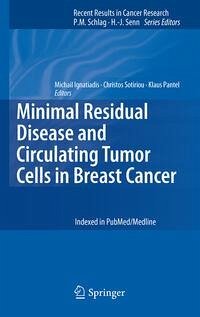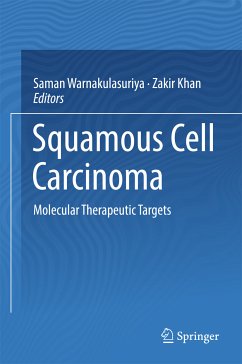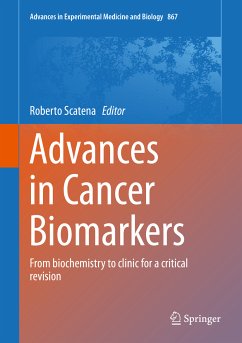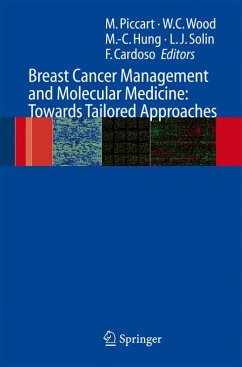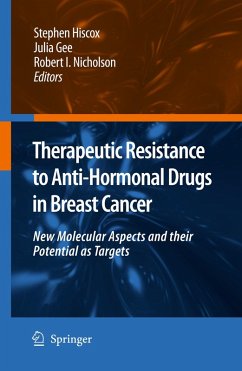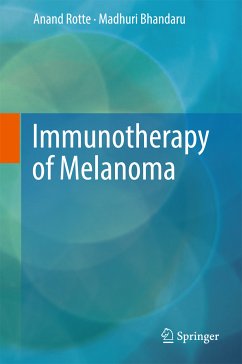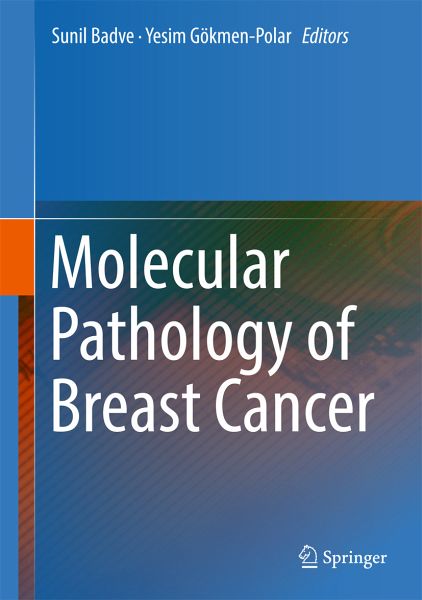
eBook, PDF
Molecular Pathology of Breast Cancer (eBook, PDF)

PAYBACK Punkte
56 °P sammeln!





Desktop ready reckoner to one and all interested in breast cancer
An overview detailing the most recent advances in the molecular pathology of breast cancer to satisfy the requirements of a diverse group of audience
Provides rationale underlying the role of molecular markers to enable development of a holistic approach to breast cancer research and treatment
Dieser Download kann aus rechtlichen Gründen nur mit Rechnungsadresse in A, B, BG, CY, CZ, D, DK, EW, E, FIN, F, GR, HR, H, IRL, I, LT, L, LR, M, NL, PL, P, R, S, SLO, SK ausgeliefert werden.
Bio Data: Prof. Sunil Badve. MBBS, MD. FRCPath. Sunil Badve is Professor in departments of Pathology and Laboratory Medicine, and Internal Medicine and the Director of Translational Genomics Core at the Indiana University Simon Cancer Center. He received his medical degree and pathology residency at Grant Medical College and Tata Memorial Hospital for cancer. He did further training at the St George's Medical School and at Royal Marsden Hospital, England. In USA, he trained at the Albert Einstein School of Medicine (NY) and at Yale. He served on the faculty of Northwestern University prior to joining Indiana University. Dr. Badve's main research and clinical expertise is in breast cancer. He is the breast Pathologist for ECOG group and serves on the Breast Cancer Steering Committee. He has been a PI and co-investigator on several NIH (R01; R21), DOD and foundation grants. He is recognized as a Komen Scholar by the Susan G Komen for the Cure. He has over publication of over 170 peer-reviewed scientific articles in addition to invited reviews and book chapters including WHO Classifications of Breast and Thymic tumors. He has several patents and has developed and commercialized a gene signature for the prognostication of thymic cancers. He serves as the associate editor of Clinical Breast Cancer and on the editorial board of six additional journals (Modern Pathology, Analytical and Cellular Pathology, Pathology, BMC Cancer, Journal of Cancer, and Journal of Molecular Biomarkers and Diagnosis). Dr. Badve is a regular speaker at national and international pathology meetings and has conducted short courses on breast pathology for the CAP and USCAP. He has served ASCO-CAP Guidelines Committee for hormone receptor assessment in breast cancer and has been a faculty presenter at the ASCO annual meeting. Bio Data: Assistant Prof. Yesim Gökmen-Polar, Ph.D Dr. Yesim Gökmen-Polar is an Assistant Research Professor in the Department of Pathology and Laboratory Medicine at Indiana University School of Medicine. She received her Ph.D. in Molecular Biology at Bogazici University, Department of Molecular Biology and Genetics, Istanbul, Turkey. She further continued her training in cancer biology at the Sealy Center for Cancer Cell Biology, University of Texas Medical Branch, Galveston, Texas. She joined the Division of Hematology & Oncology at Indiana University as a research associate, and specialized in targeted therapeutics for breast cancers and thymic cancers. She serves in several working groups such as TCGA Thymoma working group, ITMIG Tumor Bank/Biology Working group and Thymoma Tissue Bank Oversight Committee at IU School of Medicine. She also serves as a reviewer for several journals including BMC Cancer, Neoplasia, Clinical Breast Cancer, Pathology-Research and Practice, and Oncotarget. She is also a speaker for Affymetrix and a faculty presenter in meetings including USCAP and AACR. Her research interests are centered on the identification and characterization of novel prognostic and therapeutic targets in breast cancer and thymic cancer. She has approximately 50 publications mainly in the field of cancer biology. She has patents in breast cancer prognostication and has developed and commercialized a gene signature for the prognostication of thymic cancers. Her specific expertise is in development of novel therapeutic targets (i.e. targeting EphA2 receptor tyrosine kinase, protein kinase C beta, anti-tubulins and TORC1/2) in colon, breast cancer and thymic malignancies. Her lab developed and characterized a novel human thymoma model, designated as IU-TAB-1, which was derived from a patient with the stage II thymoma (WHO type A/B). Her current research uses next generation sequencing (NGS), microarrays, and computational tools to understand the transcriptional regulation by non-coding RNAs and alternative splicing that contribute to breast cancer recurrence/metastasis. Her lab uses these approaches to develop novel therapeutics to target breast cancer and thymic cancer.
Produktdetails
- Verlag: Springer Nature Switzerland
- Seitenzahl: 428
- Erscheinungstermin: 26. November 2016
- Englisch
- ISBN-13: 9783319417615
- Artikelnr.: 53148737
Für dieses Produkt wurde noch keine Bewertung abgegeben. Wir würden uns sehr freuen, wenn du die erste Bewertung schreibst!
Eine Bewertung schreiben
Eine Bewertung schreiben
Andere Kunden interessierten sich für


